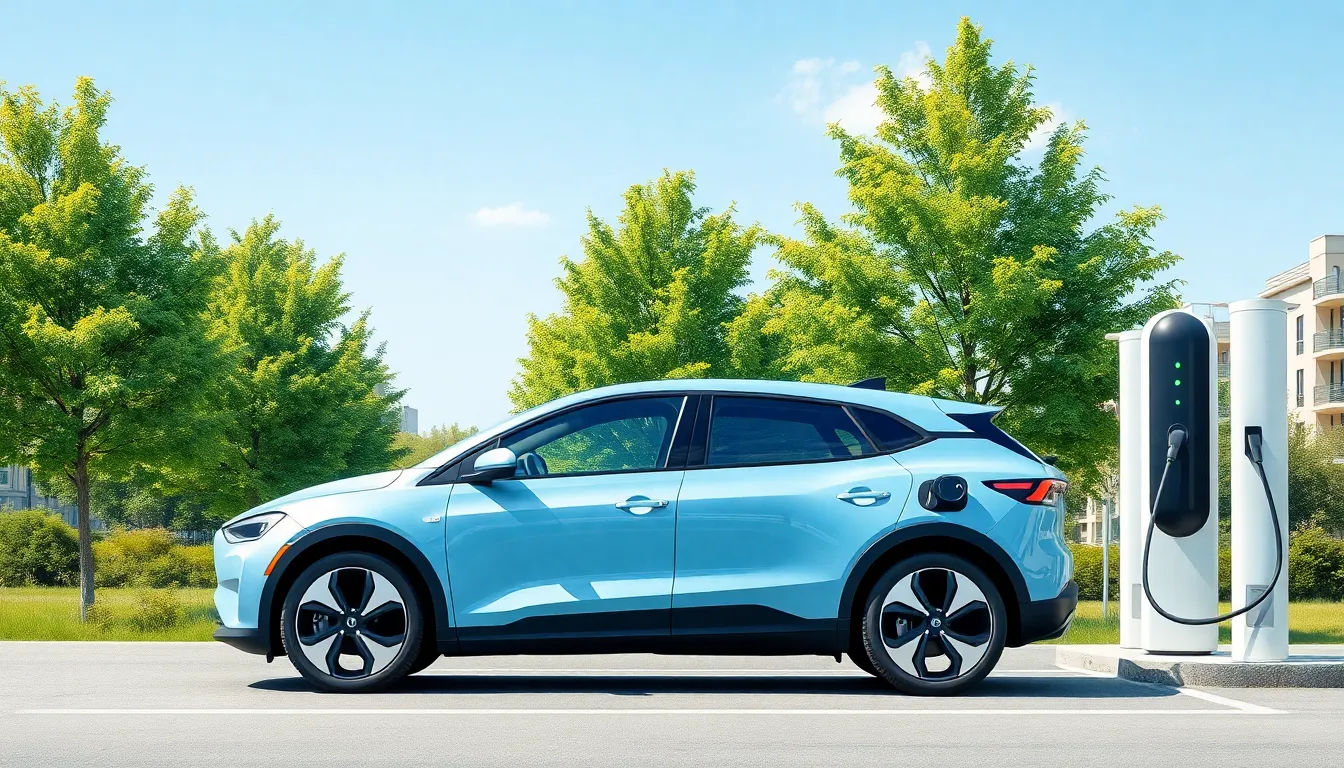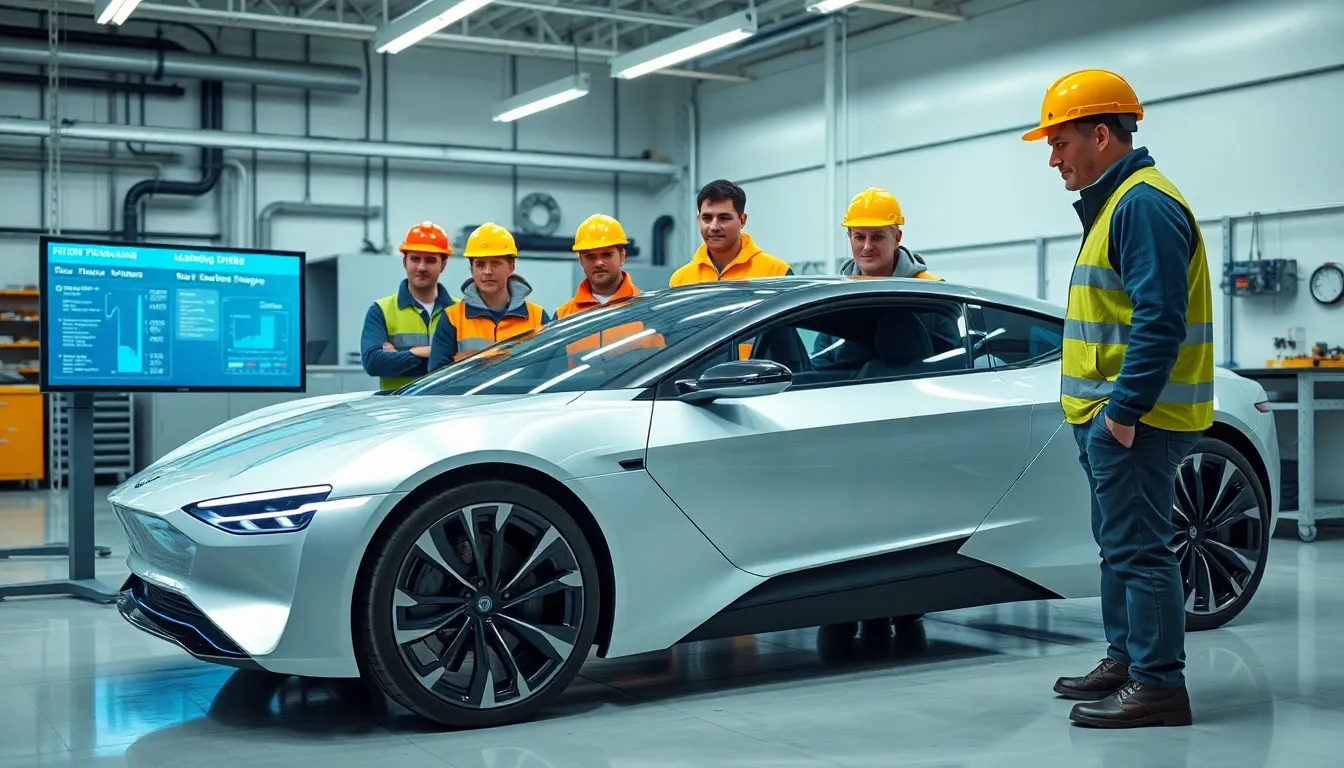In a world where cars seem to have more gadgets than your smartphone, staying updated on automotive technology is essential. From self-driving features that make your car feel like a co-pilot to electric vehicles that could make a Tesla blush, the automotive landscape is evolving faster than you can say “vroom vroom!”
Automotive Technology News
Automotive technology news highlights ongoing innovations in the industry. Recent developments focus on electric vehicles, enhancing sustainability and performance. Self-driving capabilities represent another major trend, pushing the boundaries of safety and convenience. Manufacturers implement advanced driver-assistance systems to improve overall driving experiences.
Updates on connectivity features show a shift toward smart vehicles. Integration of artificial intelligence allows for better navigation and personalized user experiences. Battery technology advancements significantly extend electric vehicle ranges, making them more accessible for consumers. Charging infrastructure also expands, accommodating the growing number of electric vehicles on the market.
Collaborations between tech companies and automotive manufacturers accelerate progress in these fields. Partnerships aim to develop software solutions that complement hardware upgrades. Additionally, regulatory changes impact the adoption and development of new technologies.
Consumer interest in sustainable practices drives research into alternative fuel sources. Hydrogen fuel cells and biofuels rise in prominence as viable options. Emphasis on environmental impact pushes manufacturers to refine their approaches, leading to a greener automotive future.
Market analysis indicates that consumers increasingly prioritize safety and connectedness. High demand for features like remote diagnostics and over-the-air updates shapes production strategies. Reports emphasize the importance of adapting to market trends while maintaining competitive advantages.
Technology news continually evolves, making it crucial for stakeholders to stay informed. Regular updates from industry leaders ensure transparency in advancements and innovations. Following automotive technology news provides insights into future developments and opportunities for growth in the market.
Recent Innovations in Automotive Technology

Recent advancements in automotive technology exemplify a commitment to sustainability and enhanced vehicle performance. The industry shifts toward electric and hybrid solutions alongside the evolution of autonomous driving capabilities.
Electric Vehicles and Hybrid Innovations
Electric vehicles (EVs) and hybrids gain traction due to advanced battery technology. Range improvements allow for longer trips without frequent charging. Major manufacturers invest heavily in research for solid-state batteries, which promise faster charging times and increased durability. Furthermore, the expansion of charging networks supports the growing number of EV users. Interest in environmental sustainability drives the introduction of models with lower carbon footprints. The rise of consumer preferences for eco-friendly options pushes manufacturers to prioritize green technology.
Autonomous Driving Developments
Autonomous driving technologies transform how people interact with vehicles. Companies increasingly incorporate sophisticated sensors, cameras, and AI algorithms for improved safety and convenience. Recent iterations of advanced driver-assistance systems (ADAS) enhance functionalities like lane-keeping assistance and adaptive cruise control. Increasing regulatory support encourages manufacturers to adopt automated features on public roads. Many consumers now expect connectivity options within these systems, leading to stronger integration with smartphones and smart devices. New collaborations between tech firms and automakers expedite the development of these innovations, ensuring continued progress in the realm of smart driving.
Industry Trends Shaping Automotive Technology
The automotive sector experiences continuous transformation, driven by innovative technologies and evolving consumer demands. Two impactful trends include the rise of connected cars and sustainability initiatives.
Connected Cars and IoT Integration
Connected vehicles utilize internet connectivity to enhance communication between cars and external systems. Connectivity enables features like real-time traffic updates, navigation assistance, and remote diagnostics. Automakers integrate IoT devices to create smart ecosystems, improving driver experiences. Advanced driver assistance systems rely on this connection for functionalities such as collision warnings and parking assistance. Consumers increasingly expect vehicles to communicate seamlessly with their smart devices, boosting demand for advanced infotainment systems. Collaboration between tech firms and car manufacturers fosters innovation, enhancing the overall connectivity landscape.
Sustainability and Green Technology Initiatives
Sustainability efforts gain momentum as automotive companies emphasize eco-friendly practices. Electric vehicle adoption rises, fueled by advancements in battery technology and charging infrastructure. Major players invest in high-capacity battery solutions, enabling longer ranges and quicker charging times. As a result, more consumers choose EVs, driven by a desire to reduce their carbon footprints. The shift toward hybrid models also continues, blending traditional and electric engines to enhance efficiency. Regulations promote greener alternatives, urging manufacturers to prioritize sustainability in design and production. This commitment to green technology shapes the future of automotive manufacturing and consumer choices.
Key Players in the Automotive Technology Sector
The automotive technology sector features significant contributions from various stakeholders. Major players and innovative startups both shape the future of this industry.
Major Automakers and Their Contributions
Automakers lead the charge in advancing automotive technology. Tesla emphasizes electric vehicles, driving innovation in battery technology and autonomous capabilities. General Motors has invested heavily in EVs and infrastructure, promoting its Chevrolet Bolt and Hummer EV models. Ford focuses on hybrid and all-electric options, underscoring its commitment to sustainability with the Mustang Mach-E. Toyota champions hydrogen fuel cell technology while maintaining its position in the hybrid market with the Prius. Volkswagen pursues an ambitious electric vehicle strategy with its ID series, aiming to dominate the EV market. These companies play a pivotal role in enhancing vehicle performance and promoting sustainable practices.
Startups and Disruptors in the Industry
Startups bring fresh perspectives to automotive technology, often leading to disruptive innovations. Rivian has garnered attention for its all-electric trucks and SUVs that combine rugged performance with sustainability. Lucid Motors focuses on luxury EVs, showcasing advanced battery technology and high-range capabilities. Furthermore, Waymo pioneers autonomous driving solutions, pushing the boundaries of self-driving technology with real-world trials. Nuro specializes in autonomous delivery vehicles, redefining last-mile transportation solutions. These new entrants challenge traditional automakers and accelerate developments in electric, connected, and autonomous vehicles.
Future Predictions for Automotive Technology
Advancements in automotive technology are expected to accelerate rapidly. Experts predict that electric vehicles (EVs) will dominate the market by 2030, with global sales anticipated to exceed 30 million units annually. Innovations in solid-state batteries promise to enhance efficiency and reduce charging times significantly.
Autonomous driving capabilities are advancing toward greater acceptance. Regulatory frameworks are evolving to support the deployment of advanced driver-assistance systems (ADAS), which will likely offer enhanced functionality in urban environments. Predictive algorithms and machine learning are set to improve navigation and safety features, making connected vehicles safer.
Connectivity will also play a crucial role in future vehicles. Integration with smart devices is anticipated to become seamless, allowing users to access their vehicle’s status in real-time. Expect the incorporation of vehicle-to-everything (V2X) communication, which can improve traffic management and reduce congestion.
Sustainability will remain at the forefront of industry initiatives. Major automotive companies are committing to net-zero emissions by 2050 and are investing heavily in renewable energy sources. Increasingly, consumers are favoring brands that prioritize eco-friendly practices, influencing future market dynamics.
Collaborations between tech firms and traditional manufacturers are likely to intensify. Partnerships focused on artificial intelligence and big data aim to refine vehicle performance and user experience. This combination of expertise will shape the development of more intuitive driving experiences.
Market trends suggest that safety and connectivity will continue to be consumer priorities. Enhanced features such as remote diagnostics and over-the-air updates will set industry standards. Staying informed on these trends will be essential as developments unfold rapidly in automotive technology.
Conclusion
The landscape of automotive technology is evolving at an unprecedented pace. As advancements in electric vehicles and autonomous driving continue to shape the industry, staying updated on these trends is crucial for consumers and enthusiasts alike. The push for sustainability and enhanced connectivity reflects a broader shift towards eco-friendly practices and smarter vehicles.
With major players and innovative startups driving these changes, the future of automotive technology promises to be exciting and transformative. As the market moves towards electric dominance and improved safety features, it’s essential for individuals to remain informed about the latest developments that will redefine their driving experiences.

